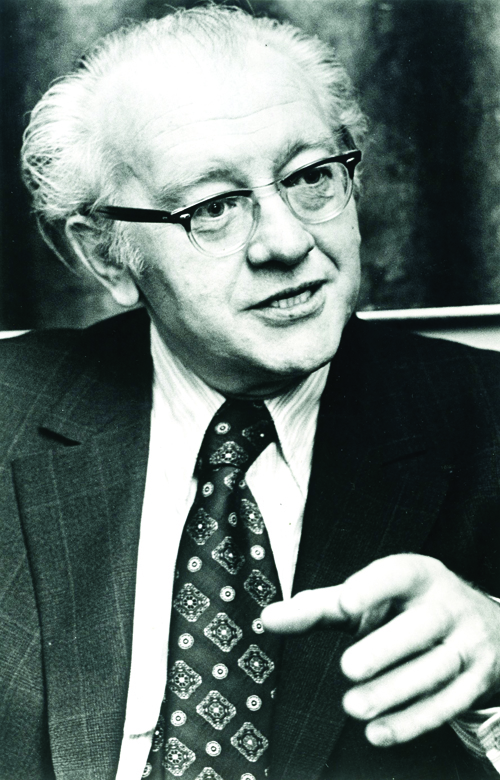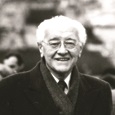
Karel Husa passed away December 14, 2016. Born in Prague in 1921, Husa’s best-known works include Apotheosis of This Earth, Music for Prague 1968. and String Quartet No. 3, for which he won a Pulitzer Prize in 1969. Husa was a student of Arthur Honegger and Nadia Boulanger, and he emigrated to the United States in 1954 to teach at Cornell University, where he remained until his retirement in 1992. Husa graced our pages with his wit and wisdom three times between 1987 and 1992. Following are excerpts of his conversations with Judy Nelson in 1987, Frank Battisti in 1990, and Harvey Phillips in 1992.
Introduction to Music
As a boy, I remember a musician who must have played some sort of baritone or tuba at a funeral. My job was to hold his music because he didn’t have an instrument with a holder. I walked backwards in the funeral procession holding his part. (October 1987)
First Compositions
When I was about 13 I wrote some little pieces for violin and piano and piano solo. One I called Spring Song, another one Lullaby; the others I don’t remember very well. They were really nothing, just tonic and dominant chords, but they gave me the feeling that I would like to write music, and that I didn’t forget. (July 1990)
Conducting
First of all the conductor needs the technique to convey the music with the baton or with his hands. The technique should be so good that one doesn’t even notice it. Some may think technique is not so important, but I think it’s incredibly important, because you don’t have time in rehearsals to explain what you will do with your hands at every moment. It’s like playing the piano; you don’t spell out fingerings for every single measure.
A second factor is attitude, how well and how efficiently you can work with an ensemble. Whether it’s a professional or student ensemble, the problems are the same: we never have enough rehearsal time.
You also should know how to deal with people, and that is not as easy as it sounds. You come to a rehearsal with the best intentions and things may turn out in a way that you hadn’t planned. You have to be a juggler of feelings. Technique is very important, and how the conductor deals with the players is very important. You can get a lot from players, or you can appear in front of an ensemble that has so much to offer and get nothing from them. A conductor has to come in front of a group completely prepared. In 15 minutes the performers can say whether the conductor knows the score or not; you cannot fool anybody. (July 1990)
Teaching
I have wonderful memories of helping aspiring composers and conducting the student orchestra for 20 years. I remember programming an orchestra concert with the Berg Violin Concerto, but from the beginning it was obvious that the students did not care for it. Once we put it together with Louis Krasner though, it became the most incredible experience for those students, something they have never forgotten and which they still talk about with me 20 or 30 years later. They learned that some things created recently are important and that we cannot write music the way Beethoven or Brahms did, even though they did it so beautifully.
I don’t have any bad memories of teaching but there were some disappointments. I remember rehearsing my Apotheosis of This Earth at some school, but I noticed that it was the piece the students least liked. When conducting, you can see the interest or lack of interest, and in despair I told the performers that if they did not want to play it, we would replace it with something they liked. When they voted, only three students raised their hands, so I changed the piece. I think that later the students regretted their decision, but it was too late then. I made this decision because it was my own music; 1 have never changed other composers’ works. (September 1992)
Listening
When I studied painting, some teachers just showed me Rembrandt, Rubens, and da Vinci, just these masters. One painter showed me everything – Brueghel, Cranach, and also very modern painting. The same idea should hold in music. Some teachers won’t give students anything new until they know Mozart and Beethoven perfectly; but giving young people the experience of hearing new music is important because it touches their thinking. Otherwise they will not be open to it later. (October 1987)
Introducing New Music
The conductor’s attitude is very important; I always found it helped when I had a positive attitude and believed in a piece. I believe the Berg Violin Concerto is good music and have faith that in time students will realize its value. Conductors should be persistent and always present a piece in the most positive way, even if some rehearsals are disappointing. With new music, some rehearsals will not do justice to the music, but with classical music you know it’s not the fault of the music. Even so, I would rather play new pieces with students because life is short. I always thought students would continue to play in the future, but many of them leave and go into another profession; even when they are in music, they may not have the opportunity to perform many new compositions.
If they understand what new music is to them, they can transfer it to others. I remember when I was in my last year at the conservatory in Prague, the Hungarian quartet Vegh performed Bartók’s Quartet, and I was bewildered because to me it wasn’t music. Now, when I listen to it many years later, I recognize that it is very close to Beethoven’s Quartet. We have to help young people by explaining what new music is, and letting them play it enough to decide for themselves.
I think it helps for a director to share some insights into the composer and the work at the first rehearsal, and directors should also explain why a composer did certain things that the students do not understand immediately. Going into the unknown is important and exciting. We cannot always go into the forest and take the path that has been there for a hundred years; especially when you are young, you should go somewhere that everybody said not to. That is always what I like to do. To only play well known pieces makes students tired. In college I have noticed that students sometimes become bored when they play the same repertoire as in high school. If they had a good high school conductor, one who showed them new possibilities and taught them incredible things, they may be disappointed when they get into college and repeat the same things. (September 1992)
The Composing Process
When I compose, I begin with a few notes, and then the music starts to develop like a game of checkers. Let’s say I have three notes. I take the notes and play with them, perhaps looking at them as though they were reflected by a mirror. What goes up in sound will go down in sound in the mirror. Then I transpose the notes into other notes. Now I have 10 notes, which I start to develop into a motif and some other ideas. Then I go ahead. (October 1987)
Staging
In Music for Prague my idea was to spread the percussion wherever possible on the stage and have three different players play the same instrument but of high pitch, medium pitch, and low pitch. I spread them around the wind ensemble or orchestra so that the effect is like bells ringing around the city of Prague. It’s an incredible effect. In the Concerto for Wind Ensemble I thought it would be interesting for the players, who always sit in the same places, to be separated and hear the music from a different angle. If you are a horn player or trombone player and are always sandwiched between timpani behind you and trumpet in front of you, you always hear the music the same way. (July 1990)
Composers and Audiences
Some audiences do not want to accept new ideas, and some composers think they would belittle themselves if they came closer to the audience and tried to establish a link with them. When I write music I don’t think directly about the audience and whether they will accept it or not; I think in terms of what would touch me and how I understand music. When I compose I’m using musical language that is based on what we have from the past. I don’t want to break with tradition; at the same time I cannot write music in the language of Beethoven. Yet music is a language, and if we can still use some things from the past, why not? Sometimes I see scores that use new terms or symbols for pizzicato or crescendo and decrescendo. We still have these normal signs and symbols, so why not use them? As a conductor I usually have three rehearsals and then a concert. If we change the vocabulary, it would take so much time to explain what I want to do to the orchestra or band that I would never get to the music. This is also true of the musical content; there are things we still can use.
In terms of language, we continue to use words that we inherit from tradition. We might add new words that explain something in contemporary terms, but we don’t completely discard what we have grown to understand and use. It seems to me the same is true in musical composition. An audience comes with a certain background of musical experiences, so it’s wise to build on that background, to add things, but not to leave the audience completely afloat, trying to cope with something unlinked to history and tradition.
Yes, and also we have to be aware of differences between audiences. An audience accustomed to only light music would find the Fourth Symphony of Beethoven a little exhausting. On the other hand, audiences familiar with classical, romantic, and impressionistic music can even accept Schoenberg and Berg because they still use a language from the past. If the music has a specific content, it can be advanced technically and the public will still understand it. When I was a student in Prague around 1945, I heard Bartok’s String Quartet No. 4, and it really bewildered me. Here I was, a young composer, and I had heard new things, yet I thought this bordered on not being music. Today when I listen to that piece, it seems like Beethoven, absolutely classical music, and I wonder how I ever could have thought that this bordered on non-music. The music doesn’t change, but we change.
We accept it after repeated listenings; time soothes the dissonances. Time even soothes the abstraction of Picasso or Braque that 40 years ago looked incredibly sophisticated; today it seems simple. (July 1990)
Evolution
From generation to generation there will always be changes in music – from romantic to classical or from scientific to romantic – music from the heart or music from the brain. These changes occur constantly; they are part of our life. Music somehow always represents what happens in the world. (October 1987)





